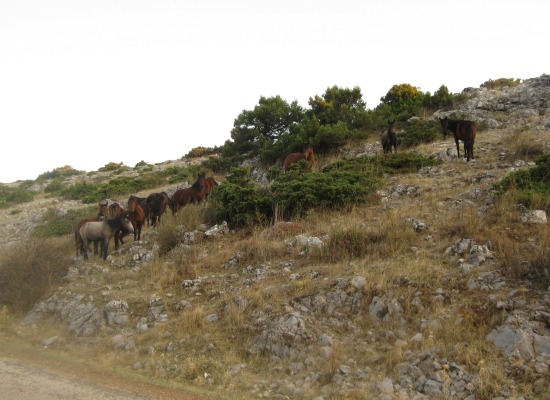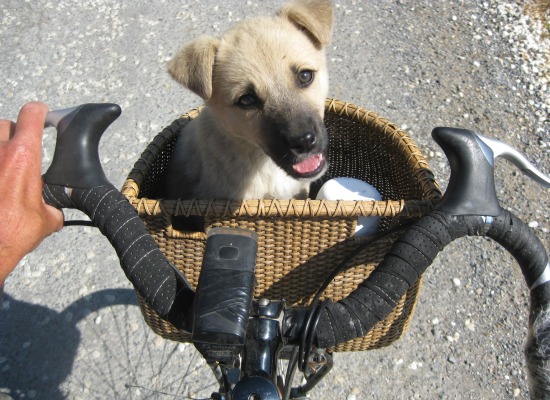The Final Sprint to Istanbul
The townspeople ogled the tourist he’d captured. “From America,” the cop boasted, like he’d shot me at 400 yards with a rifle
/https://tf-cmsv2-smithsonianmag-media.s3.amazonaws.com/filer/20111103024013SunsetSpilDag2WebSmall.jpg)
Late one night as I slept on a chilly moonscape plateau in Spil Dag National Park, a ruckus out in the rock fields woke me: Took-a-lump took-a-lump took-a-lump. I sat up and saw a herd of the park’s wild horses galloping past in that proud and pompous way that these animals exhibit—like they know that we keep tacky pictures of them on our walls and listen to rock songs about them. The animals neighed as they went past my camp, their manes flailing in the wind and their flanks so shiny that they glistened in the light of the moon.
The full moon.
For a month had passed since the bear had walked into my camp, and two weeks since I’d stayed in a room, and 12 days since I’d last shaved. But more relevant was that I had only a week until my flight out of Istanbul. I turned on my headlamp and had a good look at my map. The city was 500 kilometers away by freeway, and if I hoped to do any scenic riding I would need to move at least 120 kilometers every day and still reserve at least two full days in the city to handle all the joyless logistics of wrapping up a bicycle tour—finding a cardboard shipping box, packing the bike away, getting to the airport, sleeping there.
At sunrise, I stretched out my hamstrings and gazed over Turkey. The north slope of Spil Dag dropped off so sharply that I imagined that, leaning outward just enough, I could spit onto a taxi in the streets of Manisa, which sprawled silently thousands of feet below. To the southwest was Izmir and beyond that the glistening Aegean. The previous night, the sunset had been no less spectacular—rows of peaks in all directions glowing rosy red as dusk softly fell. It was a view worth a day of my life.

A herd of Spil Dag wild horses grazes by the road.
Thirty kilometers north of Manisa, a tiny Kangal puppy jumped out of the scrub as I came its way. It gave chase, tripping on oversized feet and howling desperately. The day was blazing hot and I was miles from anywhere. I stopped, sure that the animal would die if I left it. I placed her in my basket and went onward. I briefly (for about 40 seconds) entertained the idea of taking her to Istanbul, paradise for stray dogs, but thought better of things and left her in a village by the water fountain. Though many folks in rural Turkey will kick their dogs and clobber them with sticks, they nonetheless keep them alive. It’s a conundrum, and I promised the puppy, “You may not like it, but you’ll live.”

A Kangal puppy receives a lift from the author to the nearest village.
I couldn’t resist taking a scenic route into the mountains the next day, and as I passed through a town called Gördes, a plainclothes police officer flagged me down and showed me his badge. Armed with a passport and a Turkish tourist visa, I could have said “So what?” and moved on, but I generally try to be a cordial and pleasant person. I handed over the requested document. He grinned, pleased at my obvious discomfort—and pocketed my passport.
“Is there a problem?” I asked.
“None,” he answered smugly, then suggested, “Çay?”
I walked in cold silence beside this bully to the station, he strutting proudly as the townspeople ogled the tourist he’d captured. “From America,” the cop boasted, like he’d shot me at 400 yards with a rifle. At the station, six of them sat with me for tea, and a boy came promptly with a tray of tulip-shaped glasses. One of the officers took my passport and began making mysterious phone calls. He shouted rapidly (which is simply how people talk here) at some distant colleague and paced excitedly around the patio while examining the pages of my passport, turning it around and rotating his head to read the visa stamps.
“Problem?” I asked again, not sure that village cops had any right to confiscate my property.
“No,” said the one who apprehended me. I lifted my arms and shrugged. “Please, my passport.”
He grinned his stupid grin again and with his hand beckoned me to wait. He stretched in the sun like a fat cat. They freed me after two maddening hours, and I got out of Gördes well past noon to begin a long slow climb into the mountains. I took a dirt road, believing it would be a shortcut, but it dead-ended in the woods. I walked for an hour and by evening had gone just 70 kilometers—hopelessly behind schedule. I had water, wine and a few almonds, but I was done playing the monk. I wanted a real dinner. I found asphalt, then a village, and in it a market, but it was the sort of village market stocked with just candy bars and chips. No less than 20 young boys had swarmed my bike and were now peering in the doorway. “Do you have tomatoes?” I asked. “And a melon?” The clerk got on the telephone and made some arrangement. He told me to wait as it grew dark, and after 15 puzzling minutes, an older fellow—his dad, as it turned out—arrived carrying a tray set with a plate, silverware, salt and pepper, four whole tomatoes and a melon. He set it on the counter and offered me a stool. The crowd outside the door waited eagerly—it was feeding time.
But this was too awkward. “I’m sorry,” I said, patting my chest graciously. “But I must go. Can I have this in a, um, plastic bag?” The father and son promptly packed up my meal, even taking several minutes with scissors and tape to make a small package to carry some salt, and handed it over. Predictably enough, they refused money. “But this is a place of business!” I tried to say—but when a Turk has it in his mind to be generous, there is no fighting it. Embarrassed, I left town and slept in a field.
I did 130 kilometers the next day. That night it poured, and in the morning it was still coming down. I drank cold coffee in my tent until almost noon, then made a break for it. A half pint of water raced down my back as I slipped out of my tent and into the rain. Just three miles later, almost to the town of Susurluk, I got my first flat tire of the whole trip and, as I repaired it, my pump broke. I walked to town in the drizzle and found a bike shop. The man repaired it—and flicked his chin and made that tsk sound at the sight of my money. “But-” Oh. What was the point of objecting? Then he called for tea.
Outside, in the clammy cold, I’d have dropped 2,000 bucks on the spot for teletransport lift to San Francisco. Realistically, there was the option of a bus to Istanbul, but I wasn’t eager to run the risk of dented spokes and smashed derailleurs. My best option, then, was a ferryboat to Istanbul. The nearest port was Bandirma, 30 miles north, and with the rain at a drizzle and a tailwind begging me to hit the road, I made my final sprint. Cars and trucks splattered me with mud, and the rain soaked me to the skin—but I was flying, and the kilometer postings dwindled fast. 40. 30. 20. At 10, the rain started again and the traffic thickened as I neared the city. At last, I rolled into the terminal, all mud and sweat and stink. I piled my grubby luggage through the x-ray security gate, apologizing for the mess that I was, and bought a ticket for the 9:30 p.m. boat.
I arrived in Istanbul in the wee hours of the morning. Several blocks from my friend Irem’s apartment, I stopped at a late-night kiosk for a package of almonds. The young clerk saw the exhaustion in my eyes, I think, and as I opened my wallet he unleashed his hospitality upon me in the simplest way he knew: He jutted out his chin, sharply waved his hand and gently patted his chest. I would have fought—but I had no fight left in me. Turkey, marvelous, marvelous Turkey: I owe you a beer—and a thousand cups of tea.
/https://tf-cmsv2-smithsonianmag-media.s3.amazonaws.com/accounts/headshot/Off-Road-alastair-bland-240.jpg)
/https://tf-cmsv2-smithsonianmag-media.s3.amazonaws.com/accounts/headshot/Off-Road-alastair-bland-240.jpg)